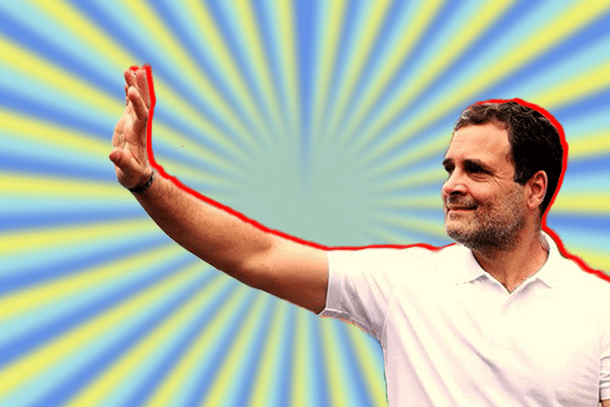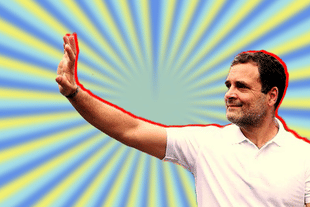Politics
Year-End Roundup: The ‘Latke-Jhatke’ Politics Of Rahul Gandhi
Venu Gopal Narayanan
Dec 23, 2022, 03:24 PM | Updated 03:21 PM IST
Save & read from anywhere!
Bookmark stories for easy access on any device or the Swarajya app.


A series of elections and political events across the year show that the Congress will continue to be the nation’s principal opposition party for some time to come.
Although Arvind Kejriwal and his Aam Aadmi Party (AAP) have repeatedly sought to wangle a seat at the high table, through an expensive, relentless, media blitz, questionable pre-poll surveys which give improbable forecasts for the AAP, and a reckless, fiscally-senseless sledgehammer pledge of boundless welfarism, they remain restricted to two states in one corner of the country — Delhi and The Punjab.
Therefore, the Congress’s politics merits in-depth scrutiny, especially as exemplified by its de facto leader, Rahul Gandhi, as we start a busy, final year filled with provincial contests, prior to the general elections of March-May 2024.
For the past four months, Rahul Gandhi has been on a pada yatra from Kanyakumari to Kashmir.
Optimists say it will rekindle widespread popularity for the party.
Idealists say it will reinforce the principal tenets of secularism amongst the electorate.
Cynics say it is just one more costly, self-indulgent attempt at relaunching ‘Brand Rahul’, with an allied aim to consolidate the minority vote under the Congress banner.
And sceptics say the yatra will amount to nothing, as it will be forgotten by the spring of 2024.
Be that as it may, four broad points, inter alia, appear to have evolved as the integral, defining aspects of Rahul Gandhi and his party’s politics.
The platform for the exposition of these aspects is their ongoing yatra, in which, both individual and party are so acutely integrated as to make one indistinguishable from the other.
One, a refurbishment of his public image through the endorsement of celebrities with highly-pronounced views on selected ideologies and policies, and, by corollary, a definition of what his party stands for.
Two, Rahul Gandhi’s refusal to accept change.
Three, his view on national security matters, and how they ought to be dealt with.
And, four, the Congress’s nature of political discourse.
First: celebrity endorsement.
It is an intriguing crowd which Rahul Gandhi has been meeting on his yatra.
The list includes economist Raghuram Rajan, actress-activist Swara Bhaskar, rank-Leftist academician Yogendra Yadav, lapsed-Marxist Kanhaiya Kumar of ‘Bharat-tere-tukde-honge’ fame (now with the Congress), activist Medha Patkar, and controversial hate-preacher George Ponnaiah.
The opinions of these individuals, maintained fairly consistently from when they entered the limelight, cover a diverse but predictable range: a visceral disdain for Sanathana Dharma, alarmist fearmongering about the security of minorities in India (plus the propagation of their eternal victimhood), the belief that anyone advocating Hindutva is a fascist majoritarian, the usual hurrahs for liberalism, secularism, identity politics, a view that the West knows what’s good for India better than India does, that the West is always right, and a near-pathological aversion to development and private enterprise.
Raghuram Rajan has donned a Cassandra role shovelling pessimism upon the India story ever since he lost his place within the Indian establishment’s upper echelons.
Today, he is reduced to opposing the ‘Make in India’ policy by arguing that we ought not to develop our manufacturing sector to material extents.
Swara Bhaskar is a vocal supporter of the usual suspects. She has campaigned for Kanhaiya Kumar and Jignesh Mewani (now with the Congress) during their far-Left days, and participated in anti-CAA protests. The others are more of the same.
If, as the saying goes, that a man is known by the company he keeps, then the sorts Rahul Gandhi has been meeting en-route his yatra will define him in the public eye.
Of course, whom Rahul Gandhi meets is his choice, but politically speaking, it is a risk in this day and age when India’s civilisational ethos has awoken.
The problem is that if he accepts this risk, then he can’t complain about electoral outcomes; and if, at some future point he decides not to accept this risk, then he can’t disassociate himself from the company he kept for two reasons.
One, because it is too late; and, two, because if he does so, he will be contradicting the brand being built. It is a classic cleft-stick situation from which there is no escape.
Second, is Rahul Gandhi’s refusal to accept an ongoing socio-economic change as India steadfastly transitions from a post-colonial decrepitude it was ensnared in for half a century, to a prosperous, modern nation based on civilisational values.
He obdurately contests this transition because, in his view (and of those who journey with him on the yatra), it is a change for the worse, it poses an existential threat to his political fortunes, and this strange India poised upon advent is one quite different from his ‘idea’ of it.
Only one part is actually true — the threat this change poses to Gandhi, his party, and their ecosystem.
It is this fear of political oblivion which forces him to act the way he does, and hold the views he has on our polity, society, culture and icons.
The psychology of that is fairly straightforward and is best defined in the language of his breed: a ressentiment stemming from the isolation caused by his own deracination.
Or, in simpler terms: a helpless frustration at the deep disconnect with the bulk of the people, which is a result of being so culturally distanced from our traditions, and our way of life.
The eternal irony here, is that the political threat Gandhi and the Congress face are of their own making, because of their refusal to accept and embrace change.
Meaning, that the threat would dissipate if they acknowledge the very topics they rail against (an excellent example is their constant vilification of Veer Savarkar, which has actually been instrumental in making him even more popular, faster, than any natural process may have achieved).
No wonder people like Himanta Biswa Sarma and Jyotiraditya Scindia were forced to leave the Congress and join the Bharatiya Janata Party (BJP); and no surprise at the guffaws which erupt every time Gandhi tries to pose as a Hindu.
But, third, the derisive laughter stops when he speaks on national security.
Indeed, if there is one point which makes the Congress’s decline almost irreversible, it is the approach adopted by the party and its leaders to matters of vital strategic importance.
The list of misdemeanours is long and sordid.
A common strand is a tendency to seek compromise over aims and interests, be it the Shimla Accord which frittered away the phenomenal gains of 1971, allowing Chinese imports to balloon exponentially in the previous decade, diplomatic laxity which let the Chinese gain toeholds in Sri Lanka and the Maldives, a trivialisation of the 26/11 Mumbai attacks by a shameful monkey-balancing at Sharm Al Sheikh, or cosily dining with the Chinese ambassador in New Delhi even as the standoff on the Doklam Plateau was on.
In one sense, this is a congenital flaw going back to before Independence, but really, that past doesn’t matter much today. What does matter is that the party’s actions of recent years have doggedly aimed at somehow running down the BJP and Narendra Modi, even if at the cost of national unity. That is unacceptable.
For example, look at how the Congress has addressed the recent Sino-Indian clash in the Tawang border region.
Their vigorous demands for a discussion on the incident in Parliament have remained relentlessly shrill, in spite of the Defence Minister making a statement in the Lok Sabha, and all political parties having been formally briefed.
And, fourth, how they make those demands sadly exemplifies the nature of the public discourse they pursue.
The language used is third-rate, the lack of respect for political opponents is obvious, and the contempt within surfaces frequently.
Canine metaphors and sexist jibes regrettably attract no reprimand from above, or from their ecosystem, not least because these are often used by the senior leadership themselves.
Congress President Mallikarjun Kharge has used the words ‘dog’ and ‘Narendra Modi’ in the same sentence twice in the last month.
Congressman Ajay Rai described Union Minister Smriti Irani’s forays into her Amethi constituency, where she defeated Rahul Gandhi in 2019, as ‘latke-jkatke’.
Residents of Uttar Pradesh have confirmed to this writer that the phrase means sharp gyrations and hip thrusts when dancing. It is used colloquially against women, and unambiguously, with absolutely sexist connotations.
Where will this end?
A bumbling, rudderless, self-indulgent attempt at image rebranding, so distanced from the society they seek to represent and govern, devised by a man and his fawning crowd who can’t tell an Aranyaka from a Shastra (they probably will, after this piece goes to press), to preserve an idea concocted by dead white men for an ancient land which was never theirs, at the risk of undermining our efforts to tackle two large, inimical neighbours, through vile speech?
To anyone other than Rahul Gandhi, the Congress, and the left-liberal ecosystem, that is an excellent definition of impending oblivion. And the sad part is that they can neither change, nor ever accept the change which has forced them into this pattern. It is a rut with no escape.
Thus, the runup to the next general elections offers Rahul Gandhi an opportunity to either grow up or quit the field, for if he doesn’t, it is India which will be forced to pay a heavy price until the sheer cussedness of it all forces this lot to the harmless margins of our electoral sphere.
There is still time.
Venu Gopal Narayanan is an independent upstream petroleum consultant who focuses on energy, geopolitics, current affairs and electoral arithmetic. He tweets at @ideorogue.





